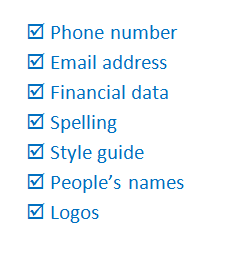I hope you find my writing and business tips and observations useful. My business and blog are dedicated to helping businesses communicate clearly and reach their potential.
Read, subscribe to my newsletter, enjoy!Tash
One coin, two sides; One budget, two perspectives
There are always two sides to a coin, two side to a story and two perspectives to view things by.
On Tuesday, the Federal Budget was announced.
I’ve read quite a few summaries of the Budget so I can write updates for clients. Some are better than others, of course.
Perspectives of the Federal Budget
However, my point relates to how small business is impacted by this Budget. Noting that small business got very little direct mention by the Government in this budget.
A number of business groups have released their view that Government ignored this significant sector of our economy. As advocates of this diverse group, they are annoyed because small business don’t appear to have been included.
Yet another business group or two has put out the view that small business was lucky to have avoided the attention big business got in the Budget. I for one am glad we don’t have to report PAYG each month, for instance.
Both views are based on the same fact (little mention of small business) but are looking at it in different ways. I found that very interesting.
You’d think the big guys would get it right…
Is it just me, or do you have more tolerance of a small business making mistakes than a big business?
That is, for mistakes like spelling errors, dead links on their website, out of date information and lack of clarity in a message.
I think if you have the budget for huge campaigns, you have the budget to get a writer or editor to help you avoid stupid mistakes. A sole trader on the other hand often has less money to spend and more hats to wear so mistakes are a little more excusable.
Budget for the details
I was asked by a major entity to complete a survey that they intend to use to produce some data that can impact on the digital media and brands.
It was longer than I expected but more than that, it was very disappointing from a group that is producing such a report.
Having a poor survey through lack of attention to detail reduces their credibility – if they can’t get the questions right, is their analysis going to be any good?
Compared to the time and money they have put into preparing and promoting this survey, and then turning the results into a report, it would have cost little to have had it reviewed by a writer or editor to ensure it would work. It’s like spending a million dollars to build your dream house but not checking the architect remembered to add a front door.
International survey
Some of the issues I came across in this particular survey were:
- I was invited twice (ie via two different .com.au email addresses) to complete this survey. Yet there was a question ‘Please enter your five digit zip code’ – my four digit postcode wasn’t accepted. So are they so ignorant to not realise we don’t all have a US zip code (the error messages actually stated “You must enter a valid US zip code”) or was this survey only meant for US residents?
Tip: if preparing any sort of online form, make it usable for all aspects of your audience – and make it clear at the start if some groups can’t participate - There were too many assumptions within the questions, but I had to answer them anyway so they are getting meaningless results from the survey. For example, “which of the following do you generate money from?” listed about six possible answers – I don’t earn money from any of them but there wasn’t a ‘none of the above’ type answer.
I did get some satisfaction in a couple of those questions if they at least gave an ‘other’ option as I wrote the real answer in that field!
Tip: always have an answer for everyone in a survey – if people can’t answer, they can skew your results with dummy answers and it frustrates them - One question asked ‘what is your key source for finding companies that don’t meet your requirements?’ followed by a series of criteria that you could use to filter out a company and a couple of other points. In other words, it made absolutely no sense and I couldn’t answer it – well I used the ‘other’ field to say it made no sense so I couldn’t choose from their list!
Tip: always do a final read of materials to ensure everything makes sense. Edits along the way can change things so read it in full to be sure – and preferably get fresh eyes to view it, too.

Poor data can’t result in a good report, whichever way you add it
One better written question they included asked where I got inspiration for my blog posts. I could only select one answer, which is limiting as I find inspiration in many places. However, I again used the ‘other’ option and wrote I am inspired by poor communications efforts I see – such as surveys like this with poor questions! You have to find fun where you can, I say!
So not a great survey (and I will struggle to trust their results) but it did inspire a blog post and gave me some amusement using their ‘other’ fields!
Expanding your market
No doubt you’ve heard that it’s a good idea to have a clearly defined market and to keep your prices as high as the value (rather than discounting all the time). It’s good advice.
Susan Oakes, however, gave a suggestion for expanding your offerings to suit a lower price market. Normally, business success doesn’t include going for a cheaper market but Susan’s idea of offering something new and cheaper is sound.
The idea is to make a product or service that either lacks the bells and whistles or is effectively a DIY version, meaning you can sell for less and appeal to a lower budget audience without detracting the price or value of your main product or service.
Want some examples?
- For those who don’t want to pay for a professional writer on small tasks, I produced a writing tips eBook. A much cheaper option for small businesses but still getting me a sale – all my eBooks follow a similar concept
- if you usually sell water tanks fully installed, maybe offer them for DIY homes as well
- wedding photographers used to sell a completed album, possibly in a package with the negatives. Now many offer a disc of images as a cheaper option as well as a full album with the disc
- a web designer could set up a series of templates and sell them as a digital product while still doing the more expensive tailored web designs as their main service
Is there a way you could expand your business to include a lower budget client? Think broadly or add your business in the comments and let’s see what ideas others can find for you…



Recent Comments